|
|
|
Sort Order |
|
|
|
Items / Page
|
|
|
|
|
|
|
| Srl | Item |
| 1 |
ID:
157849


|
|
|
|
|
| Summary/Abstract |
Despite the long standing “no concessions” argument, scientific studies now suggest that governments can benefit from negotiating with militant insurgencies. However, despite government efforts, the leaders of insurgent movements often appear fanatical and unwilling to negotiate. This behavior presents a puzzle: If the leaders of insurgencies mobilize to create political change, and a government offers concessions, why do insurgent leaders refuse to negotiate? Using a game-theoretic model, we argue that insurgent leaders may rationally reject negotiation due to an internal commitment problem. Specifically, when leaders cannot credibly share the benefits of peace with their rivals, insurgent leaders may reject offers over fear of an internal conflict, which could leave the entire group vulnerable to government exploitation. However, the model demonstrates that insurgent leaders should negotiate if power in the insurgency is shifting in favor of their rivals, as it could help them maintain control of the movement. We illustrate these hypotheses using evidence from the Nigerian state's conflict with the Movement for the Emancipation of the Niger Delta (MEND) organization and Boko Haram.
|
|
|
|
|
|
|
|
|
|
|
|
|
|
|
|
| 2 |
ID:
098245
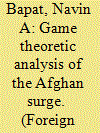

|
|
|
|
|
| Publication |
2010.
|
| Summary/Abstract |
This paper critically examines the Obama Administration's decision to increase the level of US forces in Afghanistan to combat the Taliban insurgency. Given the complexities of the Afghan situation, and the numerous tradeoffs associated with any US response, I turn to the a game theoretic model to capture the essence of the Administration's decision. Using the model, I argue that while the "Afghan surge" temporarily increases the probability that the Taliban will accede to Hamid Karzai's government, the surge produces a problem of moral hazard. Specifically, because Karzai recognizes that negotiation will allow the Obama Administration to exit the conflict, he has no incentive to make peace with the Taliban. Despite this, the model demonstrates that the political price Obama will pay for disengagement may deter the Administration from exiting Afghanistan, thereby giving Karzai to continue fighting the war at the expense of the United States. I conclude by using these insights to draw several policy implications for the US operation in Afghanistan.
|
|
|
|
|
|
|
|
|
|
|
|
|
|
|
|
| 3 |
ID:
066943
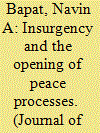

|
|
|
| 4 |
ID:
092342
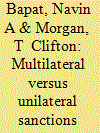

|
|
|
|
|
| Publication |
2009.
|
| Summary/Abstract |
Policymakers frequently argue that multilateral sanctions are more likely to induce a target state to alter its behavior than are unilateral sanctions. Repeated empirical studies using the familiar Hufbauer, Schott, and Elliot data set demonstrate that unilateral sanctions "work" more often than multilateral sanctions, however. In this study, we subject three theoretical explanations for this counterintuitive finding to additional empirical testing utilizing the new Threat and Imposition of Economic Sanctions (TIES) data. Somewhat surprisingly, the analyses using these new data support the intuition of policymakers; that is, multilateral sanctions do appear to work more frequently than do unilateral sanctions. Our results do support one theoretical argument, based on spatial models, that we test. This explanation holds that whether multilateral or unilateral sanctions are more effective depends on the number of issues at stake and on whether an international institution is involved. Our analyses provide support for these hypotheses.
|
|
|
|
|
|
|
|
|
|
|
|
|
|
|
|
| 5 |
ID:
078493


|
|
|
|
|
| Publication |
2007.
|
| Summary/Abstract |
Four years after the fall of Saddam Hussein, many scholars and policy makers concluded that an alliance between Iraq and al Qaeda did not exist. Yet the absence of this alliance raises a puzzle: Given their mutual interest in opposing U.S. hegemony in the Middle East, why wasn't there an alliance between Saddam Hussein and Osama bin Laden? In this essay, we develop an explanation for why Iraq and al Qaeda did not ally using previous scholarly work on bargaining and alliances. Our explanation concludes that Iraq and al Qaeda failed to form an alliance due to mutual fears of opportunism and the problem of credible commitment. We conclude by presenting evidence for our explanation and offering a policy prescription for governments facing threats of state sponsored terrorism.
|
|
|
|
|
|
|
|
|
|
|
|
|
|
|
|
| 6 |
ID:
106023
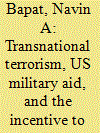

|
|
|
|
|
| Publication |
2011.
|
| Summary/Abstract |
This study proposes a strategic explanation for the USA's continued provision of military aid to host states with problems of terrorism, despite its poor empirical record. Using a game theoretic model, I demonstrate that US military aid creates a moral hazard problem. If host states are provided with the tools to pacify their territory only if terrorist campaigns are ongoing, but will lose this aid once the problem of terrorism ceases, host states have little incentive to accelerate the demise of terrorist groups. However, the model demonstrates that while military aid does not accomplish the US goal of disarming terrorists, military aid is effective at preventing host states from negotiating with terrorist organizations. The provision of military aid provides a disincentive for host states to reach a negotiated settlement with terrorist groups, and therefore prevents terrorist organizations from altering the status quo that is favorable to the USA. This suggests that while military aid may not be effective at actually disarming terrorist groups, it can be effective at keeping terrorist groups out of power. These hypotheses are tested using the Jones & Libicki (2008) data on terrorism from 1997 to 2006. The empirical results support the conclusions of the theoretical model.
|
|
|
|
|
|
|
|
|
|
|
|
|
|
|
|
| 7 |
ID:
139791
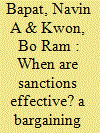

|
|
|
|
|
| Summary/Abstract |
Although a considerable literature identifies the conditions under which sanctions are more likely to be successful, few studies examine the question of when sanctioning states or senders are willing to enforce their sanctions laws against their firms. Using a game theoretic model, we argue that imposing sanctions creates a strategic dilemma for senders. We demonstrate that senders often have disincentives to enforce their sanctions policies, given that the restriction on economic transactions with targeted states may undermine their firms' competitiveness. The model indicates that sanctions are more likely to succeed when the sender's firm retains a moderate share of the target's market relative to its foreign competitors. However, the model also demonstrates that sanctions are likely to be imposed only when the conditions do not favor their success. The empirical implications of the model are tested using the Threat and Imposition of Economic Sanctions (TIES) data set.
|
|
|
|
|
|
|
|
|
|
|
|
|
|
|
|
|
|
|
|
|